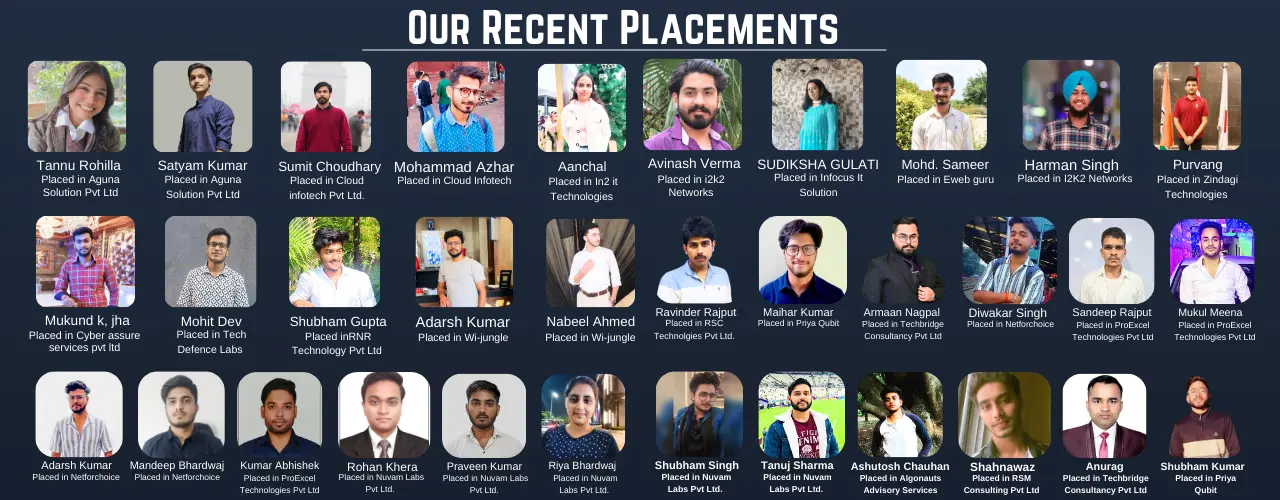Diploma in Artificial Intelligence (AI) and Machine Learning in India
October 9, 2024 2025-06-15 10:16Diploma in Artificial Intelligence (AI) and Machine Learning in India
Six-Months Diploma in Artificial Intelligence (AI) and Machine Learning
Bestseller
2000+ Reviews
472,125 students
Organizations rely significantly on data in today’s data-driven environment to inform decisions, find creative solutions to challenges, and drive innovation. Thus, there is a growing demand for experts in data science. A thorough 6-month diploma in data science is available from Craw Security, and it’s intended to provide you with the skills and knowledge you need to succeed in this fast-paced industry. Three major topics are covered in this diploma: machine learning, artificial intelligence, and Python.
- Language : Hindi, English
Book a FREE Trial Class
Training Available 24*7 Call at +91 9513805401
-
Live Instructor-Based Classes
Book a Demo Class
-
Expert Instruction
Find the Right Instructor for you
-
Lifetime Access
Online and Youtube Videos
Overview
What Will You Learn in Six-Months Diploma in Artificial Intelligence (AI) and Machine Learning?
Learners with a good understanding of doing something great with numbers, insights, model building, and analysis can seek their bright future in this highly booming domain of Data Science Diploma with AI through the world-class training faculties at Craw Security. A learning aspirant will sincerely have the best learning environment at Craw Security so that one can study through the most curated training environment.
In this magnificent field of Data Science, one will have a 6-Months Diploma in Data Science in which one will learn the following:
- Artificial Intelligence
- Machine Learning
- Python Programming for Data Science
Let’s have a closer look at what you will study in this course as well as how it will assist you in becoming an effective data science expert.
Book a Trial Demo Class
Training Available 24*7 Call at +91 9513805401

Top Courses in Machine Learning
In the globally-recognized facilities of Craw Security at Saket and Laxmi Nagar locations in New Delhi, there are several courses in Artificial Intelligence in its cluster that make it better to grab an efficient job in the market in the long run. Moreover, these primetime courses in the cluster of Artificial Intelligence are as follows:
Python is the foundation upon which modern data science is built. In order to provide a more straightforward comprehension of the intricacies involved in data analysis, this course is intended to provide students with a solid foundation in Python programming. You are going to acquire:
- Introduction
- Programming language introduction
- Translators (Compiler, Interpreter)
- Uses of computer programs
- Algorithm
- Flow chart
- Python Introduction
- History
- Why python created
- Fields of use
- Use of Python in Cybersecurity
- Reasons for using Python
- Syntax
- Installation of IDE
- Variables
- What is variable
- Declaration rules
- Multiple variable declarations
- Valid and invalid variables
- Type casting
- Data Type
- Introduction
- Discuss all data types
- Use type() to show dynamically typed language
- String
- List
- List: List Comprehension
- Tuple
- Dictionary
- Set
- Operators
- Introduction
- Arithmetic operators
- Assignment operators
- Comparison operators
- Logical operators
- Identity operator
- Bitwise operator
- Membership operator
- Control Flow
- Introduction to Conditional Statement
- Conditional Statement: if
- Conditional Statement: elif
- Conditional Statement: else
- Conditional Statement: Nested if
- Introduction to Looping
- Looping: for loop
- Looping: While loop
- Looping: Nested loop
- Function
- Introduction function
- Declaration, calling of function
- Lambda function
- Filter
- Reduce function
- Map function
- File Handling
- Introduction
- Text file handling
- Binary file handling
- Object Oriented Programming
- Introduction
- Difference b/w procedural programming and OOPS
- Class
- Object
- Encapsulation
- Inheritance
- Abstraction
- Polymorphism
- Web Scrapping
- Introduction
- Introduce basic HTML tags
- Introduction to Requests Library
- Introduction to bs4
- Scrapping through Beautiful Soup
- Numpy
- Creating NumPy arrays
- Properties of Array
- Indexing and Slicing
- Aggregate Functions
- Numpy Functions
- Vectorization
- Broadcasting
- Boolean indexing
- Pandas
- Series
- Data Frame
- Data Frame Properties
- Data Frame indexing and slicing
- Reading data from various sources
- Dataframe Functions
- Pandas Functions
- Filter Data
- Visualization
- Introduction to Matplolib and Seaborn
- Properties of plots
- Line plot
- Histogram / Distplot
- Bar plot/ Count Plot
- Pie Chart
- Heat Map
- Scatter Plot
- Box Plot
Artificial intelligence (AI) is causing a revolution in a variety of sectors all over the world, including the healthcare and financial sectors. This course will provide you with an introduction to the field of artificial intelligence and the various applications of this field. The following subjects are discussed:
- Artificial Neural Network and Regularization
- Single layered ANN
- Multiple Layered ANN
- Vanishing Gradient problem
- Dropout
- Introduction to Deep Learning
- Difference between ML, DL, and AI
- Activation functions
- Gradient Descent
- Computer Vision & OpenCV
- What is Computer Vision
- History of Computer Vision
- Tools & Technology used in Computer Vision
- Application of Computer Vision
- What is OpenCV
- Installation of OpenCV
- The first program with OpenCV
- Reading & Writing Images
- Capture Videos from Camera
- Reading & Saving Videos
- Image Classification
- Haar Cascade Classifier
- Image Classification with CNN
- Object Detection
- What is Object Detection
- Object Detection using Haar Cascade
- Introduction to NLP
- What is Natural Language Processing
- Uses of NLP
- Application of NLP
- Components of NLP
- Stages of NLP
- Chatbot
- Text Preprocessing
- Tokenization
- Non-Alphabets Removal
- Bag of Words
- Stemming & Lemmatization
- Sentiment Analysis
- What is Sentiment Analysis
- Challenges in Sentiment Analysis
- Handling Emotions
- Sentiment Analysis with ANN
- Sequence Model
- Sequential Data
- Recurrent Neural Network
- Architecture of RNN
- Vanishing Gradient Problem in RNN
- Long Short-Term Memory
Machine learning is the driving force behind artificial intelligence, and it is causing a shift in the way that businesses analyze and respond to data. This lesson will walk you through the fundamentals of machine learning as well as the algorithms that underpin it, including the following:
- Welcome to the ML experience
- Importance of ML in your career
- AI FAMILY TREE
- System requirements
- Prerequisites
- Machine learning basics
- What is machine learning
- Classification and regression
- Supervised and Unsupervised
- Preparing for your ML journey
- EDA and Preprocessing
- Reading/Writing Excel, CSV, and Other File Formats
- Basic EDA (Info, Shape, Describe)
- Handling Missing Values
- Handling Outliers
- Handling Skewness
- Encoding Categorical Data (One-Hot, Label Encoding)
- Data Normalization and Scaling (MinMax, Standard Scaler)
- Feature Engineering
- Correlation Analysis and Heatmaps
- Train-Test Split & Cross-validation Strategy
- Introduction to Regression
- Simple Linear Regression
- Multiple Linear Regression
- Lost and Cost Function (Mean Squared Error)
- Regression Evaluation Metrics
- Assumptions of Linear Regression
- Polynomial Regression
- Regularization
- Overfitting vs Underfitting
- Bias Variance trade-off
- Ridge and Lasso Regularization
- Cross Validation
- Introduction to Classification
- Introduction to Logistic Regression
- Model Evaluation: Accuracy, Precision & Recall
- Model Evaluation: F1 Score, Confusion Matrix
- SVM
- Decision Tree
- Ensemble Learning
- What is Ensemble Learning
- Bagging
- Random Forest
- Introduction to Boosting
- Boosting: Adaboost
- Boosting: Gradient Boost
- Boosting: XG Boost
- Introduction to Hyperparameter Tuning
- Hyperparameter Tuning: GridsearchCV
- Hyperparameter Tuning: RandomizedSearchCV
- Model Selection Guide
- Selecting the Right Evaluation
- Unsupervised ML
- Introduction to Clustering
- K-Means Clustering
- Principal Component Analysis

Market Share of Data Science
The size of the global market for data science platforms was estimated at USD 103.93 billion in 2023. Over the course of the forecast period, it is expected to increase at a compound annual growth rate (CAGR) of 24.7%, from USD 133.12 billion in 2024 to USD 776.86 billion by 2032.
A software program that provides a platform for a data science project’s whole life cycle is called a data science platform. These platforms enable model building, distribution, and investigation, making them indispensable tools for data scientists. Furthermore, it provides a large-scale computing infrastructure and facilitates data preparation and visualization. These systems offer a centralized platform that facilitates user collaboration.
Why Choose Craw Security to Learn 6-Months Artificial Intelligence (AI) and Machine Learning?
Choosing Craw Security for comprehensive training in Data Science with AI from highly sought-after professionals with many years of quality experience can be very beneficial for decent growth in life and significant career growth. In this regard, you may consider the following best factors before choosing Craw Security as your preferred partner in this domain:
- Full Flexibility in choosing the learning mode, such as:
- VILT (Virtual Instructor-Led Training) Sessions
- Pre-recorded Video Sessions, and
- Offline Classroom Sessions.
- World-Class Experienced Training Faculties.
- Study Materials in Both Soft and Hard Copies.
- Verified study materials from data scientists working in diverse organizations worldwide.
- Certificate of Completion after finishing the course followed by an internal exam(s).
Benefits of Learning Artificial Intelligence (AI) and Machine Learning
Nowadays, data is frequently referred to as the “new oil,” as it is the driving force behind innovation, the expansion of businesses, and scientific discoveries. The demand for experienced people in the field of data science continues to rise as an increasing number of firms across all sectors become more data-driven in their implementation of plans. One of the most rewarding talents to acquire is the ability to learn data science because it provides several benefits, including the ability to develop in one’s job and the ability to solve problems.
The most important advantage of learning data science is a worthwhile investment for your future are jotted down:
- High Demand and Lucrative Career Opportunities
- Diverse Career Paths and Flexibility
- Solving Real-World Problems
- Enhanced Problem-Solving and Analytical Thinking
- Empowerment through Data Literacy
- Opportunities for Innovation and Creativity
- Mastering Cutting-Edge Tools and Technologies
- Continuous Learning and Adaptation
- Impactful Career with Global Reach
Learn at your own pace

Classroom Training
We offer customized VILT (Virtual Instructor-Led Training) sessions at your convenient hours to provide effortless training.

Online Training Class
One can also opt for the prerecorded video sessions available at any point of time from any particular location.

Corporate Training
Hire a preferred trainer at your work premises at your chosen time slots and train your employees with full efficiency.
Job Scope of Data Scientists: Exploring a Promising Career Path
In this technology-driven society, the role of Data Scientist has become one of the most desirable job options available to individuals. The demand for talented data scientists is expected to continue to increase as a result of the growing reliance that businesses have on data in order to make choices, innovate, and maintain their competitive edge. The breadth of this profession encompasses a wide range of industries, which makes it a potentially lucrative and varied field of work.
An outline of the primary Industries with High Demand for Data Scientists, and career possibilities for data scientists is presented below as part of an overview of the job scope of data scientists.
Technology | Data science is an essential component for the development of user insights, the enhancement of products, and the acceleration of innovation in technology companies. For the purpose of optimizing algorithms, personalizing content, and improving consumer experiences, companies such as Google, Amazon, and Facebook rely on data scientists. |
Finance | By assisting banks and other financial institutions in predicting market trends, evaluating risks, and identifying fraudulent activity, data scientists contribute to the financial sector. Models for algorithmic trading, credit scoring, and risk management are among the things that they are working on developing. |
Healthcare | The field of data science is seeing a revolution in the healthcare industry by enabling predictive analytics for the prevention of disease, improving patient outcomes, and personalizing therapies through the utilization of insights derived from patient data. |
Retail and E-commerce | Data scientists are employed in the retail industry to gather information on customer behavior in order to improve pricing, inventory management, and marketing techniques. Data is utilized in the development of recommendation systems that are designed to improve the overall consumer experience, similar to the systems utilized by Amazon and Netflix. |
Manufacturing | In the manufacturing industry, data scientists are primarily concerned with improving production lines, forecasting equipment breakdowns through predictive maintenance, and decreasing operating costs through the analysis of supply chain data. |
Government and Public Policy | The field of data science is utilized by governments in order to examine data from the public sector, enhance services, and propel smart city efforts. It assists in the process of making decisions for urban planning, public health, and education that are underpinned by facts. |
Career Prospects and Growth Opportunities
An individual who works as a data scientist should expect a dynamic career path that provides a variety of responsibilities and options for specialization. In this industry, some of the most popular job titles include the following:
Junior Data Scientist | Data collecting, cleaning, and giving assistance with basic data analysis are the primary responsibilities of entry-level roles. |
Data Analyst | The interpretation and evaluation of data in order to deliver business insights is the primary emphasis of data analysts, who frequently play the role of intermediaries. |
Senior Data Scientist | As their experience grows, data scientists are able to tackle increasingly difficult tasks, take the lead on projects, and design more sophisticated machine learning models. |
Machine Learning Engineer | After gaining experience in the field of machine learning, data scientists migrate into professions that need them to construct scalable machine learning models for use in business applications. |
Data Science Manager | As data scientists advance in their careers, they have the opportunity to advance into leadership positions, where they are responsible for managing teams of data professionals and driving data strategy. |
Chief Data Officer (CDO) | In a senior executive position, this individual is accountable for supervising the data management approach of the whole company and ensuring that the organization’s data assets are optimal for the achievement of business objectives. |
Skills Required for Data Scientists
An amalgamation of technical and non-technical abilities is required for a data scientist to be successful in this sector. These talents include:
- Programming Skills,
- Statistical Analysis,
- Machine Learning,
- Data Visualization,
- Big Data Tools,
- Communication Skills, etc.
Who Should Do 6 Months Diploma in Artificial Intelligence (AI) and Machine Learning?
Here’s a look at who would benefit the most from enrolling in this diploma course:
- Fresh Graduates and Students,
- Professionals Looking for a Career Change,
- IT Professionals Looking to Upskill,
- Business Professionals and Managers,
- Entrepreneurs and Startups,
- Researchers and Academics,
- Anyone Interested in Artificial Intelligence and Machine Learning,
- People Looking for Remote Work Opportunities, etc.


Our Students Are Our Strength
See What They Say About Us
Google Review (2000+) ★★★★★

Aman Mishra
Google review
Lucifer Nation
Google review
Amanjeet Singh
Google review
Anubhav Verma
Google review
Suprith Raj
Google review
Arpita Kumar
Google review
Himanshu Singh
Google review
Krishna Chaithanya
Google review
Satish
Google review
Rihan Ali
Google review
Pankaj Singh Bisht
Google review
Mohammad
Google review
Isha Sharma
Google reviewFrequently Asked Questions
About 6-Months Diploma in AI and Machine Learning
AI, or artificial intelligence, is the process of imitating human intellect in machines by programming them to think, learn, and make decisions in the same way that humans do. Natural language processing, computer vision, robotics, and expert systems are just some of the subfields that fall under the umbrella of artificial intelligence.
A subfield of artificial intelligence, machine learning (ML) focuses on the development of systems that can learn and improve from data without being explicitly programmed. For the purpose of recognizing patterns and making predictions, it requires the utilization of algorithms.
Artificial intelligence (AI) refers to the overarching notion of developing intelligent systems, whereas machine learning (ML) is a subset of AI that enables computers to acquire knowledge from data. To put it another way, machine learning is a technique that is utilized to accomplish artificial intelligence.
Three primary categories of ML are as follows:
- Supervised Learning: We train models using data that has been labeled.
- Unsupervised Learning: Unlabeled data can be analyzed by models to discover trends.
- Reinforcement Learning: Models acquire knowledge through the process of trial and error when they are rewarded or punished.
The prime skills that are needed to learn AI and ML fundamentals are as follows:
- Competence in programming languages such as Python, R, Java, and others
- The ability to comprehend mathematical concepts such as linear algebra, probability, and calculus
- Data structures and algorithmic knowledge are both required.
- Knowledge of several machine learning tools, such as TensorFlow, PyTorch, or scikit-learn.
AI and ML are widely used in:
- Autonomous vehicles,
- Chatbots and virtual assistants,
- Fraud detection,
- Personalized recommendations,
- Medical diagnosis,
- Predictive analytics,
- Robotics, etc.
The mainstream benefits of AI and ML technologies are as follows:
- Automation of repetitive tasks,
- Enhanced decision-making through data insights,
- Improved efficiency and productivity,
- Personalization of user experiences,
- Ability to process and analyze massive amounts of data, etc.
AI and ML are transforming industries such as:
- Healthcare,
- Finance,
- Retail,
- Manufacturing,
- Education,
- Entertainment,
- Agriculture, etc.
- Costs of early investment that are high,
- Insufficient number of experts with the necessary skills,
- Concerns of an ethical nature surrounding the privacy of data and bias,
- There is a challenge in comprehending complicated models, etc.
Some of the popular tools duly utilized in AI and ML technologies are jotted down:
- Languages used for programming: Python and R
- Examples of frameworks and libraries include TensorFlow, PyTorch, and Scikit-learn.
- AWS, Google Cloud, and Microsoft Azure are examples of cloud platforms.
- Tools for the representation of data include Tableau and Power BI.
Although having a fundamental understanding of linear algebra, calculus, and statistics is beneficial, there are numerous resources that simplify these ideas for those who are just starting out. Practical applications frequently rely on libraries and frameworks that have already been constructed.
AI has the potential to automate certain jobs, which could result in employment displacement in certain fields. Nevertheless, it also provides new roles in the development of artificial intelligence, data analysis, and the management of technology.
How long it takes to learn something is determined by your existing knowledge and your ambitions. As opposed to advanced expertise, which may require years of study and practice, basic abilities can be acquired by beginners in as little as six to twelve months.
Artificial intelligence brings ethical problems around accountability, privacy, and bias. It is essential to design artificial intelligence systems that are open to scrutiny, impartial, and in line with the values of society.
Some popular AI and ML Certifications are as follows:
- Google AI Certification,
- Microsoft Certified: Azure AI Engineer Associate,
- IBM AI Engineering Professional Certificate,
- Coursera Machine Learning by Andrew Ng, etc.
- Learning programming (Python is a good start),
- Studying ML basics through online courses (e.g., Coursera, edX),
- Practicing with projects and datasets,
- Exploring AI frameworks like TensorFlow and PyTorch,
There will be developments in autonomous systems, natural language processing, edge computing, and the incorporation of artificial intelligence into daily technology in the future of artificial intelligence and machine learning.
In fact, the hazards include:
- Abuse of artificial intelligence for potentially harmful objectives,
- Ethical conundrums that arise during the decision-making process,
- The loss of jobs and the disparity in economic conditions, etc.






